Unit 1 A family outing 课件(39张PPT,内嵌音频)
文档属性
| 名称 | Unit 1 A family outing 课件(39张PPT,内嵌音频) | 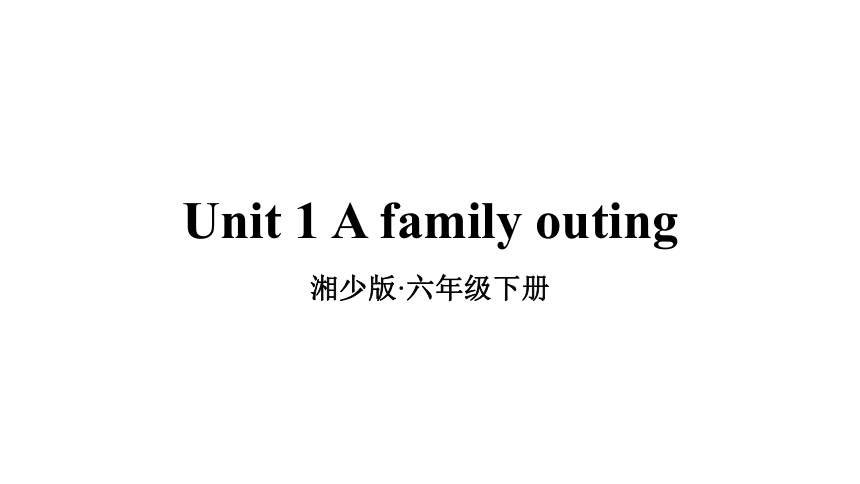 | |
| 格式 | zip | ||
| 文件大小 | 9.9MB | ||
| 资源类型 | 教案 | ||
| 版本资源 | 湘少版 | ||
| 科目 | 英语 | ||
| 更新时间 | 2020-06-02 18:13:04 | ||
图片预览

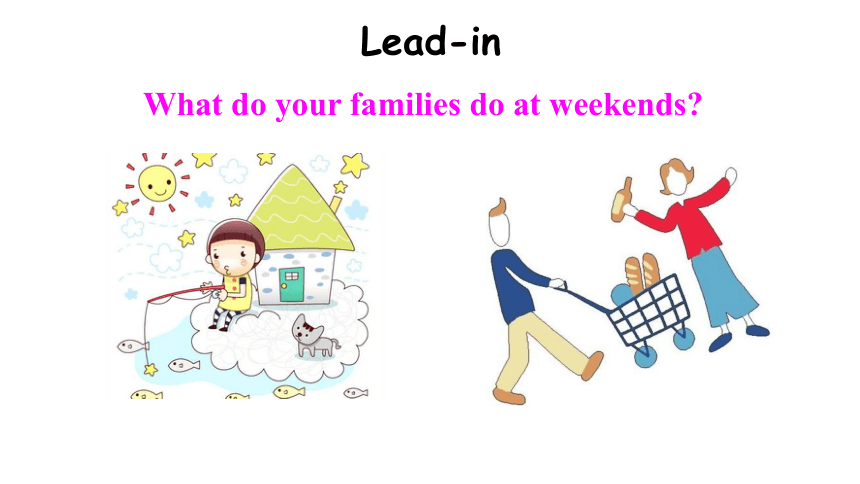
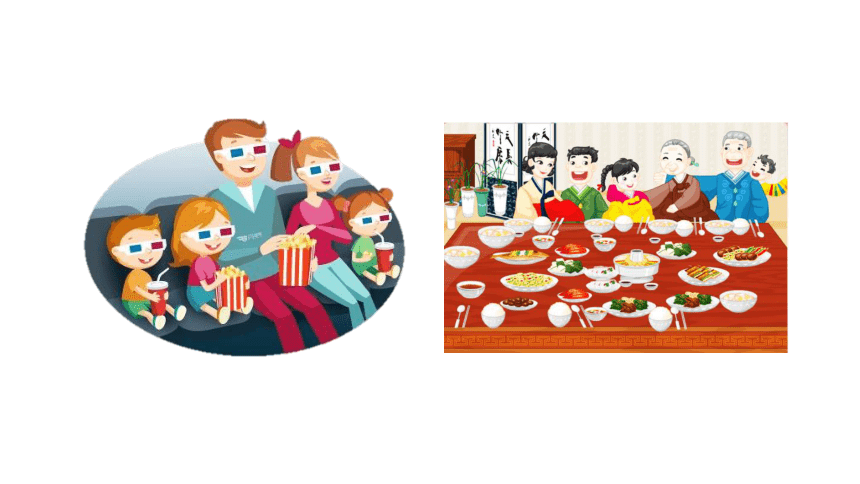
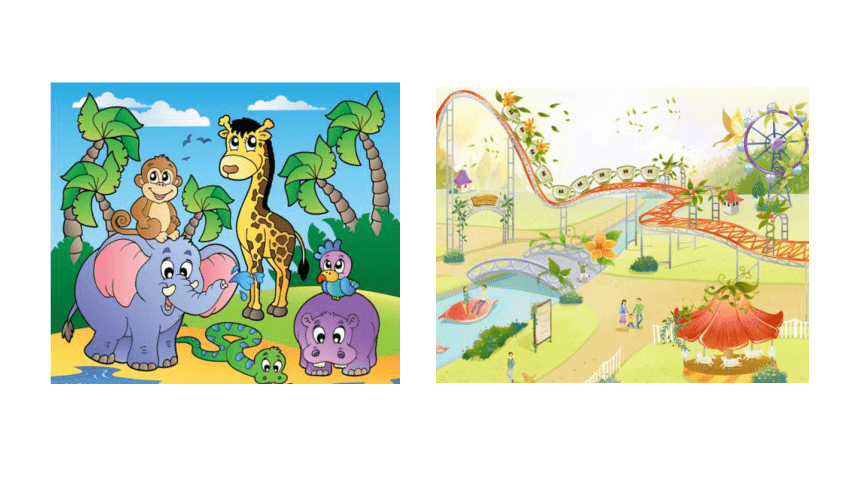


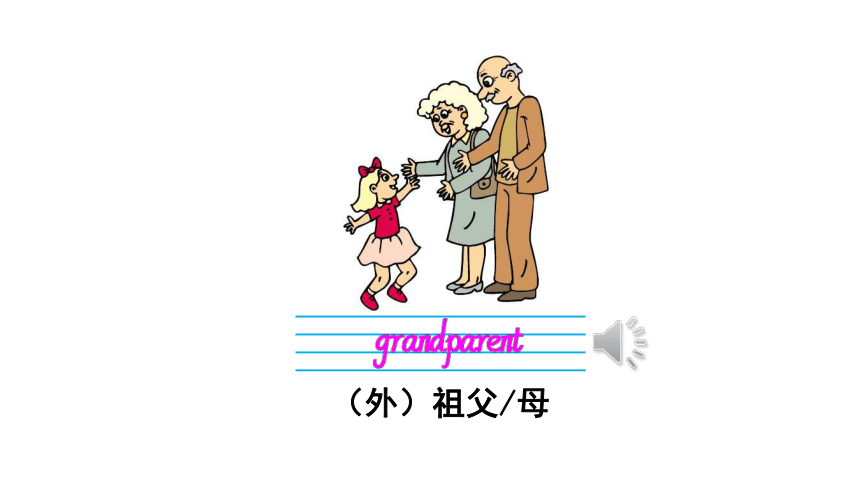
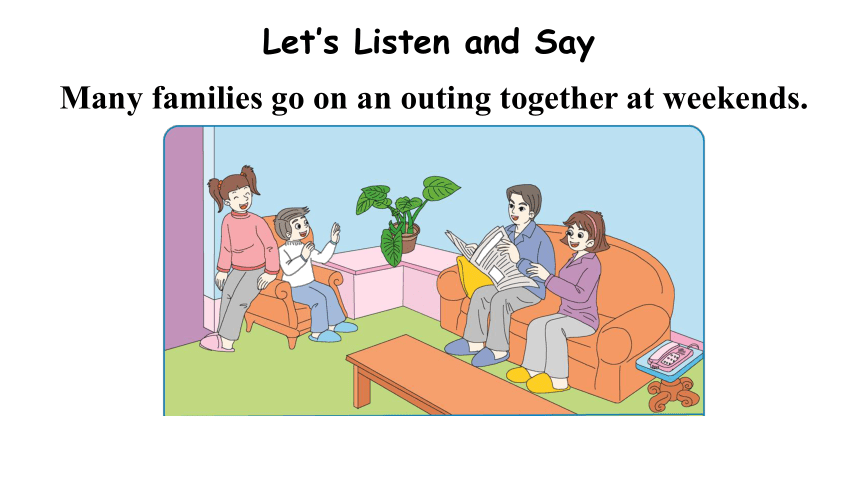
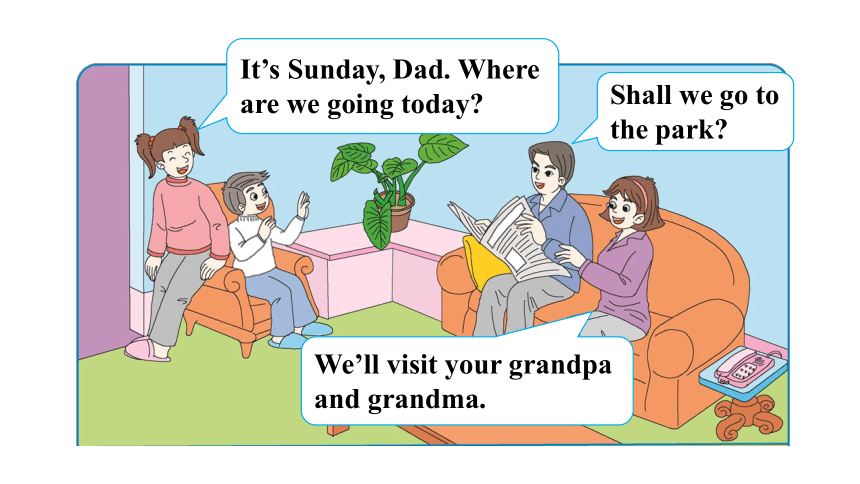
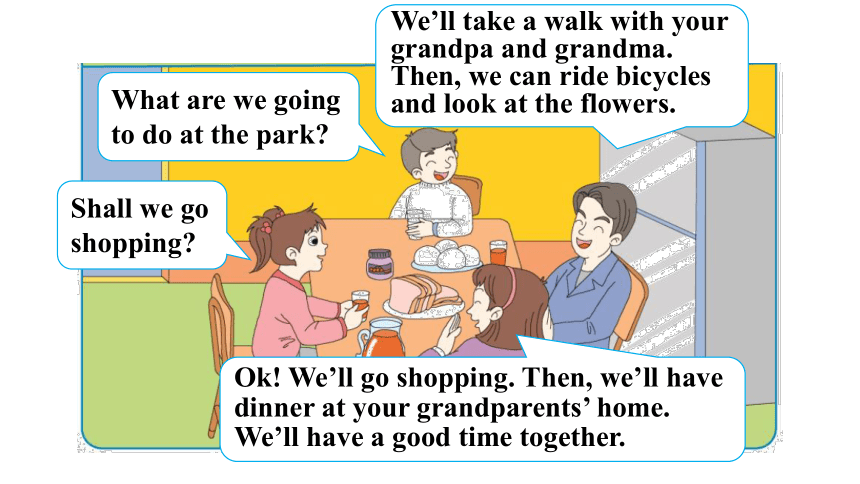
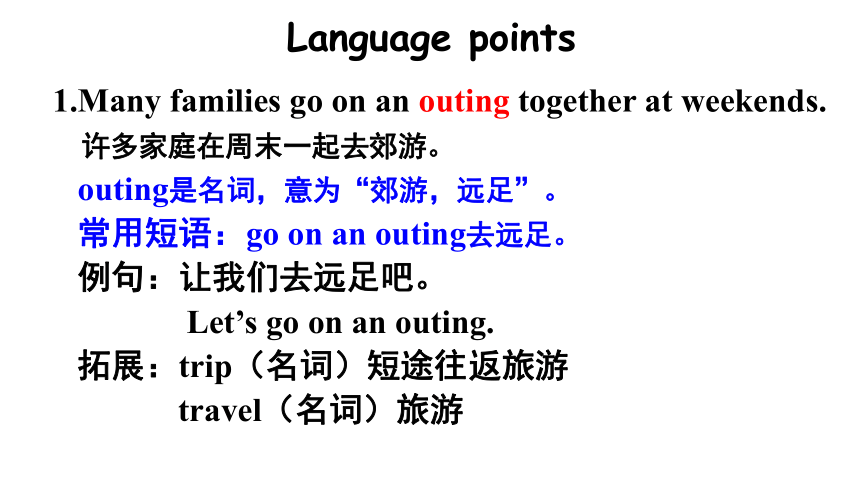
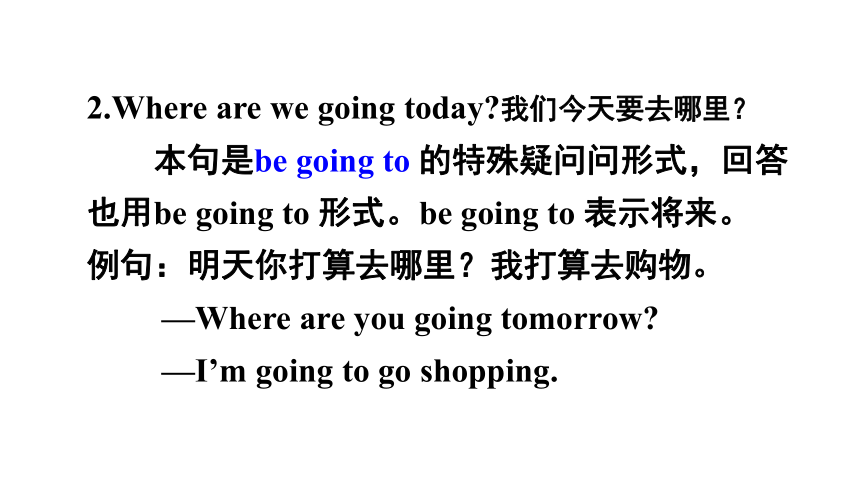
文档简介
(共39张PPT)
Unit
1
A
family
outing
湘少版·六年级下册
Lead-in
What
do
your
families
do
at
weekends?
New
words
在一起
骑(自行车/马等)
(外)祖父/母
Let’s
Listen
and
Say
Many
families
go
on
an
outing
together
at
weekends.
It’s
Sunday,
Dad.
Where
are
we
going
today?
Shall
we
go
to
the
park?
We’ll
visit
your
grandpa
and
grandma.
What
are
we
going
to
do
at
the
park?
We’ll
take
a
walk
with
your
grandpa
and
grandma.
Then,
we
can
ride
bicycles
and
look
at
the
flowers.
Shall
we
go
shopping?
Ok!
We’ll
go
shopping.
Then,
we’ll
have
dinner
at
your
grandparents’
home.
We’ll
have
a
good
time
together.
Language
points
1.Many
families
go
on
an
outing
together
at
weekends.
许多家庭在周末一起去郊游。
outing是名词,意为“郊游,远足”。
常用短语:go
on
an
outing去远足。
例句:让我们去远足吧。
Let’s
go
on
an
outing.
拓展:trip(名词)短途往返旅游
travel(名词)旅游
2.Where
are
we
going
today?我们今天要去哪里?
本句是be
going
to
的特殊疑问问形式,回答也用be
going
to
形式。be
going
to
表示将来。
例句:明天你打算去哪里?我打算去购物。
—Where
are
you
going
tomorrow?
—I’m
going
to
go
shopping.
3.Shall
we
go
to
the
park?我们去公园吗?
Shall
+第一人称代词(I、we),用于征求他人意见。
例句:我们现在开始好吗?
Shall
we
begin
now?
注意:shall和will都可表示将来,但shall常用于
第一人称,will可用于所有人称。且在表
示征求意见时,will
常于第二人称。
4.Then,
we’ll
have
dinner
at
your
grandparents’
home.
然后,我们会在祖父母家吃晚饭。
grandparents’是grandparents的所有格形式,表示“祖父母的”
。
例如:students’
desks
孩子们的课桌
books’
prices
书本的价格
表示有生命的名词所有格,加’s
以“-s”结尾的复数名词所有格只加“’”
不以“-s”结尾的复数名词所有格加“’s”
各自所有,每个名词都加“s”
共同所有,最后一个词加“’s”
Mary’s
book玛丽的书
the
students’
books
学生们的书
the
children’s
books
孩子们的书
Mary’s
and
Lily’s
mother
玛丽的妈妈和莉莉的妈妈
Mary
and
Lily’s
mother
玛丽和莉莉的妈妈
种类
构成
例句
单数
复数
由and连接
的两个名词
?
Let’s
Learn
family
outing
do
things
together
家庭郊游
一起做事情
watch
a
movie
go
shopping
看电影
去购物
take/have
a
walk
look
at
the
flowers
散步
赏花
go
shopping去购物
go
+
v.-ing表示“去……”
例句:今天下午我们将去购物。
We
will
go
shopping
this
afternoon.
拓展:go
swimming
去游泳
go
fishing
去钓鱼
go
hiking
去远足
Let’s
Practise
My
family
goes
to
the
beach
on
Sundays.
We
enjoy
ourselves.
My
family
watches
a
movie
together.
My
family
goes
to
the
library.
My
family
goes
to
the
restaurant
for
lunch
with
my
grandparents.
1.My
family
goes
to
the
beach
on
Sundays.
我们一家在星期天去海滩。
Language
points
此句是一般现在时态,主语是My
family,是第三人称单数,此时谓语动词go应该用第三人称单数形式goes.
1.一般在词尾加-s
2.以字母s,
x,
ch,
sh或有些以o结尾的加-es
3.以辅音字母加y结尾的,改y为i再加-es
read--reads
look--looks
go--goes
guess--guesses
carry--carries
fly--flies
动词第三人称单数形式的变化规则:
变化规则
例子
2.
We
enjoy
ourselves.我们玩得很开心。
enjoy
ourselves
意为“过得愉快,玩得开心”,
enjoy
oneself相当于have
a
good
time。
例句:我们在海滩上玩得很开心。
We
enjoy
ourselves
on
the
beach.
Let’s
Read
At
weekends,
many
families
go
on
an
outing.
Some
go
to
the
parks.
Some
go
to
the
shopping
centres.
Mr
Liu
likes
to
take
his
family
to
the
beach
for
a
swim
and
a
picnic.
They
enjoy
the
day
there.
They
like
to
swim
in
the
sea
and
relax
on
the
sandy
beach.
His
daughter
likes
to
play
games
on
the
beach.
Mrs
Liu
brings
sandwiches,
cakes
and
drinks
for
the
family.
They
are
happy
to
have
time
together.
They
have
lots
of
fun
and
they
love
each
other
more.
Put
a
tick
or
a
cross
.
1.
Many
families
go
shopping
at
weekends.
2.
Mr
Liu’s
family
has
a
picnic
at
the
park.
3.
Mr
Liu’s
daughter
doesn’t
like
to
play
on
the
beach.
4.
Mrs
Liu
brings
food
and
drinks.
5.
They
love
each
other
more.
√
√
√
×
×
Language
points
1.Mr
Liu
likes
to
take
his
family
to
the
beach
for
a
swim
and
a
picnic.
刘先生喜欢带着他的家人去海滩游泳、野餐。
(1)
like
to
do
sth.意为“喜欢做某事”。
例句:我喜欢在河里游泳。
I
like
to
swim
in
the
river.
拓展:like
doing
sth.
也表示“喜欢做某事”。
like
doing和like
to
do都表示"喜欢做某事",但动名词所表示的动作,在意义上比较一般和抽象,时间观念不强,不指某一次动作;动词不定式则常指某个具体的动作。
(2)
take...to...:把某人/某物带到某地去。
例:你能把它带到教室里去吗?
Could
you
take
it
to
the
classroom?
注意:若to后面接地点副词(如here,
there,
home)则to要省去。
2.
Mrs
Liu
brings
sandwiches,
cakes
and
drinks
for
the
family.
刘太太为家人带了三明治、蛋糕和饮料。
bring...for...:意为“给某人带来某物”。
例:我朋友给我带来了一本书。
My
friend
brings
a
book
for
me.
拓展:“给某人带来某物”
还可以用bring
sb.
sth.
这个结构叫双宾语结构。
例:请带给我一本书。
Please
bring
me
a
book.
Please
bring
a
book
for
me.
3.
They
have
lots
of
fun
and
they
love
each
other
more.他们玩得很开心并且更加爱彼此了。
more作形容词或代词,是many和much的比较级,表示“更多的,更大的”。
常用短语:more
than
多于
more
and
more
越来越……
what’s
more
此外
the
more...the
more...越……,越……
Write
down
your
answers.
Let’s
Write
1.
What
does
your
family
usually
do
at
weekends?
My
family
.
2.
Where
does
your
family
usually
go
at
weekends?
My
family
.
usually
watches
TV
at
weekends
usually
goes
to
the
park
at
weekends
3.
Name
three
things
you
want
to
do
with
your
family
at
weekends.
(a)_____________________________________
(b)_____________________________________
(c)_____________________________________
play
football
go
shopping
go
fishing
The
more
we
get
together
The
more
we
get
together,
together,
together,
the
more
we
get
together,
the
merrier
we’ll
be.
For
your
friends
are
my
friends,
and
my
friends
are
your
friends.
The
more
we
get
together,
the
merrier
we’ll
be.
Let’s
Have
Fun
Unit
1
A
family
outing
湘少版·六年级下册
Lead-in
What
do
your
families
do
at
weekends?
New
words
在一起
骑(自行车/马等)
(外)祖父/母
Let’s
Listen
and
Say
Many
families
go
on
an
outing
together
at
weekends.
It’s
Sunday,
Dad.
Where
are
we
going
today?
Shall
we
go
to
the
park?
We’ll
visit
your
grandpa
and
grandma.
What
are
we
going
to
do
at
the
park?
We’ll
take
a
walk
with
your
grandpa
and
grandma.
Then,
we
can
ride
bicycles
and
look
at
the
flowers.
Shall
we
go
shopping?
Ok!
We’ll
go
shopping.
Then,
we’ll
have
dinner
at
your
grandparents’
home.
We’ll
have
a
good
time
together.
Language
points
1.Many
families
go
on
an
outing
together
at
weekends.
许多家庭在周末一起去郊游。
outing是名词,意为“郊游,远足”。
常用短语:go
on
an
outing去远足。
例句:让我们去远足吧。
Let’s
go
on
an
outing.
拓展:trip(名词)短途往返旅游
travel(名词)旅游
2.Where
are
we
going
today?我们今天要去哪里?
本句是be
going
to
的特殊疑问问形式,回答也用be
going
to
形式。be
going
to
表示将来。
例句:明天你打算去哪里?我打算去购物。
—Where
are
you
going
tomorrow?
—I’m
going
to
go
shopping.
3.Shall
we
go
to
the
park?我们去公园吗?
Shall
+第一人称代词(I、we),用于征求他人意见。
例句:我们现在开始好吗?
Shall
we
begin
now?
注意:shall和will都可表示将来,但shall常用于
第一人称,will可用于所有人称。且在表
示征求意见时,will
常于第二人称。
4.Then,
we’ll
have
dinner
at
your
grandparents’
home.
然后,我们会在祖父母家吃晚饭。
grandparents’是grandparents的所有格形式,表示“祖父母的”
。
例如:students’
desks
孩子们的课桌
books’
prices
书本的价格
表示有生命的名词所有格,加’s
以“-s”结尾的复数名词所有格只加“’”
不以“-s”结尾的复数名词所有格加“’s”
各自所有,每个名词都加“s”
共同所有,最后一个词加“’s”
Mary’s
book玛丽的书
the
students’
books
学生们的书
the
children’s
books
孩子们的书
Mary’s
and
Lily’s
mother
玛丽的妈妈和莉莉的妈妈
Mary
and
Lily’s
mother
玛丽和莉莉的妈妈
种类
构成
例句
单数
复数
由and连接
的两个名词
?
Let’s
Learn
family
outing
do
things
together
家庭郊游
一起做事情
watch
a
movie
go
shopping
看电影
去购物
take/have
a
walk
look
at
the
flowers
散步
赏花
go
shopping去购物
go
+
v.-ing表示“去……”
例句:今天下午我们将去购物。
We
will
go
shopping
this
afternoon.
拓展:go
swimming
去游泳
go
fishing
去钓鱼
go
hiking
去远足
Let’s
Practise
My
family
goes
to
the
beach
on
Sundays.
We
enjoy
ourselves.
My
family
watches
a
movie
together.
My
family
goes
to
the
library.
My
family
goes
to
the
restaurant
for
lunch
with
my
grandparents.
1.My
family
goes
to
the
beach
on
Sundays.
我们一家在星期天去海滩。
Language
points
此句是一般现在时态,主语是My
family,是第三人称单数,此时谓语动词go应该用第三人称单数形式goes.
1.一般在词尾加-s
2.以字母s,
x,
ch,
sh或有些以o结尾的加-es
3.以辅音字母加y结尾的,改y为i再加-es
read--reads
look--looks
go--goes
guess--guesses
carry--carries
fly--flies
动词第三人称单数形式的变化规则:
变化规则
例子
2.
We
enjoy
ourselves.我们玩得很开心。
enjoy
ourselves
意为“过得愉快,玩得开心”,
enjoy
oneself相当于have
a
good
time。
例句:我们在海滩上玩得很开心。
We
enjoy
ourselves
on
the
beach.
Let’s
Read
At
weekends,
many
families
go
on
an
outing.
Some
go
to
the
parks.
Some
go
to
the
shopping
centres.
Mr
Liu
likes
to
take
his
family
to
the
beach
for
a
swim
and
a
picnic.
They
enjoy
the
day
there.
They
like
to
swim
in
the
sea
and
relax
on
the
sandy
beach.
His
daughter
likes
to
play
games
on
the
beach.
Mrs
Liu
brings
sandwiches,
cakes
and
drinks
for
the
family.
They
are
happy
to
have
time
together.
They
have
lots
of
fun
and
they
love
each
other
more.
Put
a
tick
or
a
cross
.
1.
Many
families
go
shopping
at
weekends.
2.
Mr
Liu’s
family
has
a
picnic
at
the
park.
3.
Mr
Liu’s
daughter
doesn’t
like
to
play
on
the
beach.
4.
Mrs
Liu
brings
food
and
drinks.
5.
They
love
each
other
more.
√
√
√
×
×
Language
points
1.Mr
Liu
likes
to
take
his
family
to
the
beach
for
a
swim
and
a
picnic.
刘先生喜欢带着他的家人去海滩游泳、野餐。
(1)
like
to
do
sth.意为“喜欢做某事”。
例句:我喜欢在河里游泳。
I
like
to
swim
in
the
river.
拓展:like
doing
sth.
也表示“喜欢做某事”。
like
doing和like
to
do都表示"喜欢做某事",但动名词所表示的动作,在意义上比较一般和抽象,时间观念不强,不指某一次动作;动词不定式则常指某个具体的动作。
(2)
take...to...:把某人/某物带到某地去。
例:你能把它带到教室里去吗?
Could
you
take
it
to
the
classroom?
注意:若to后面接地点副词(如here,
there,
home)则to要省去。
2.
Mrs
Liu
brings
sandwiches,
cakes
and
drinks
for
the
family.
刘太太为家人带了三明治、蛋糕和饮料。
bring...for...:意为“给某人带来某物”。
例:我朋友给我带来了一本书。
My
friend
brings
a
book
for
me.
拓展:“给某人带来某物”
还可以用bring
sb.
sth.
这个结构叫双宾语结构。
例:请带给我一本书。
Please
bring
me
a
book.
Please
bring
a
book
for
me.
3.
They
have
lots
of
fun
and
they
love
each
other
more.他们玩得很开心并且更加爱彼此了。
more作形容词或代词,是many和much的比较级,表示“更多的,更大的”。
常用短语:more
than
多于
more
and
more
越来越……
what’s
more
此外
the
more...the
more...越……,越……
Write
down
your
answers.
Let’s
Write
1.
What
does
your
family
usually
do
at
weekends?
My
family
.
2.
Where
does
your
family
usually
go
at
weekends?
My
family
.
usually
watches
TV
at
weekends
usually
goes
to
the
park
at
weekends
3.
Name
three
things
you
want
to
do
with
your
family
at
weekends.
(a)_____________________________________
(b)_____________________________________
(c)_____________________________________
play
football
go
shopping
go
fishing
The
more
we
get
together
The
more
we
get
together,
together,
together,
the
more
we
get
together,
the
merrier
we’ll
be.
For
your
friends
are
my
friends,
and
my
friends
are
your
friends.
The
more
we
get
together,
the
merrier
we’ll
be.
Let’s
Have
Fun
同课章节目录
- Unit 1 A family outing
- Unit 2 Some stories are more interesting
- Unit 3 We should learn to take care of ourselves
- Let's Know More
- Assessment Ⅰ
- Unit 4 Planting trees is good for us
- Unit 5 Our earth looks like this in space.
- Unit 6 Anne wanted to dance
- Let's Know More
- Assessment Ⅱ
- Unit 7 I'm not afraid!
- Unit 8 International Children's Day
- Unit 9 Look at these beautiful places in the world
- Let's Know More
- Assessment Ⅲ
